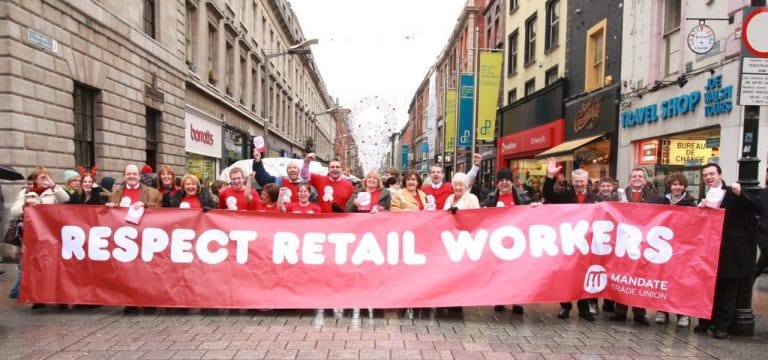As the Covid 19 crisis continues many workers, both essential and non-essential, continue to work. They are all at risk but some are at a greater risk than others.
One quarter of cases of those testing positive for Covid-19 are health care workers. Two thirds of other cases are from community transmission which includes people going in and out to work and interacting with people at work. Although there has been much praise for our shop workers the Irish Global Health Network has recently highlighted a “disregard of hygiene standards” in some shops.
It described supermarkets as “high-risk sites of infection” and that “supermarkets should adhere to the same guidance and practices that are being exercised in healthcare facilities, particularly for vulnerable shoppers.”
The only effective tool to stop the spread of the virus is to ensure all non-essential work must stop, with workers’ incomes protected, and those who continue to work must be provided with the PPE and follow HSE Guidelines in relation to social distancing, hand washing and so on.
People Before Profit is receiving reports that workplaces remain open even though they are far from “essential”. This includes places like Intel, which employs over 4000 workers and Bosch and Lomb in Waterford, with 900 workers. We have been contacted by partners of Intel workers asking why, when we are all being told to gather in groups of no more than 4, workers are being asked to go to work in large workplaces. A key lesson from Italy is, as an Italian trade union activist has put it, that workers cannot be asked to lead a “double life: on weekends they can’t even go for a walk in the park. But on Mondays they have to go back to work and come into contact with hundreds of workers”.
It has been reported to us that there have been cases of infection at a large warehouse in Dublin 17. This warehouse, which supplies supermarkets, has recently started storing food so that it can claim to be “essential”. There are also reports of worker in Panda, the waste collection company, not being provided with PPE and practicing social distancing.
In light of all we have been pushing for the Health and Safety Authority, the organisation with prime legal responsibility for ensuring workplace safety, to take a more active role in the crisis. Brid Smith T.D. has written a number of times to the Authority seeking to find out what it is doing. While she has been informed that the HAS is “receiving complaints and queries in relation to Covid19”, it is not in a position to enforce HSE Guidelines in companies that remain open. In various email she has been told that:
*“*The Health and Safety Authority’s role addresses occupational health and safety in the workplace, and not public health.
“The NSAI (National Standards Authority of Ireland) have issued advice to business which might be of assistance to companies who are providing an essential service”.
“Health and Safety Authority does not have the powers to enforce the public health guidelines”
The HSA is maintaining the fiction of the “double life”. It is untenable to suggest that workplace safety is not a public health issue if workers can go home from work and pass on the virus to other family members. The NSAI does not have the power to enforce its own advice raising the question as to who is ensuring the safety of our workers.
It is now imperative that a programme of inspection be commenced to ensure that workplaces that remain open are operating safely. Those that are not should be closed until procedures are changed. Those not doing essential work should also be closed.
People Before Profit are calling on Minister Doherty to give the HSA the powers that it needs and to instruct it to a programme of unannounced inspections.
Workers who decide to take matters into their own hands and walk out should be given full support.
